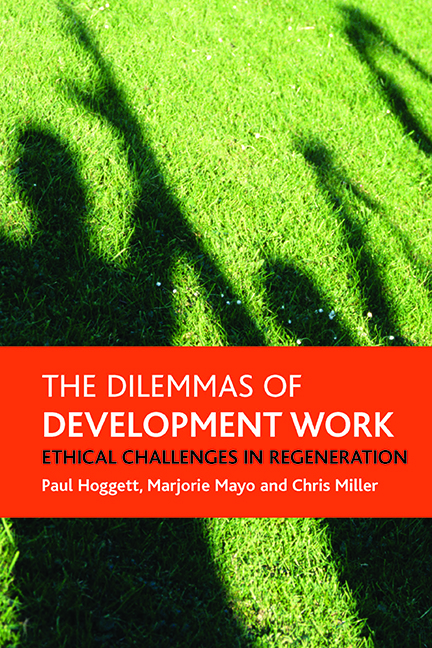two - The public sphere as dilemmatic space
Published online by Cambridge University Press: 21 January 2022
Summary
As was argued in the introduction, development work occurs across the terrain at the interface between the state and civil society, at the point where representative and participatory democracy meet. Perhaps more than any other part of life this terrain acts as an incubator for politics – it is the site from which many social movements spring, where local activists and politicians develop, where struggles for social justice grow and decline and where inter-communal conflicts are generated. It is therefore, above all, a public sphere, a place where public purposes and values are continually contested.
Ways of thinking about the relationship between government, the state and this public sphere have changed over time. Marxist, conservative and liberal perspectives, for example, offer very different pictures of the relationship between government and the state, or between the state and civil society. The picture has recently become further complicated as the concept of governance appears to have replaced the less fashionable notion of government and the idea of the ‘public sphere’ as opposed to the ‘private sphere’ appears to have been undermined and attacked. In this chapter we examine the historical evolution of some of these debates and the way in which they set the context for current attempts to grasp the nature of these relationships in a world that is far more fluid, diverse and uncertain than when the practice of community development began approximately a century ago.
Contradictions of the state
Since the start of the 20th century those engaged in fighting injustice have perceived the role of government and the state in a variety of different ways. For Marxists, the state had to be understood in the context of the wider social relations of capitalist society (Miliband, 1969). In other words, the state (including public administration) could not be divorced from class relations and class interests. The state has been considered in its largely coercive dimensions, as an instrument of repression. Later the role of the state in reproducing class relations through functions such as education, urban design and social welfare became more widely recognised. From this perspective there were real limits to the extent to which the state, even in its ‘softer’, more welfarist forms, could ever be an effective instrument for resolving social inequalities under capitalism.
Information
- Type
- Chapter
- Information
- The Dilemmas of Development WorkEthical Challenges in Regeneration, pp. 15 - 30Publisher: Bristol University PressPrint publication year: 2008
